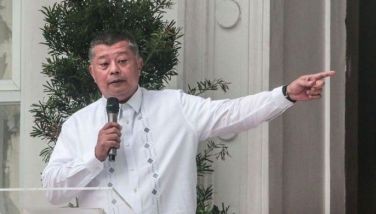JBC rejects Palace demand for more nominees to Supreme Court
MANILA, Philippines - The Judicial and Bar Council (JBC) has rejected a request from President Arroyo for more nominees from whom she will pick two new justices of the Supreme Court (SC) to fill the posts left vacant by the retirement of Associate Justices Dante Tiñga and Alicia Austria-Martinez earlier this year.
After a special meeting yesterday, all seven members of the JBC, led by Chief Justice Reynato Puno, voted unanimously not to accede to the Palace’s request for additional nominees.
Justice Secretary Agnes Devanadera, an applicant for a seat in the High Court, did not attend the deliberations since she was still in the US as part of President Arroyo’s delegation.
“The JBC cannot acquiesce to your request to expand the shortlist of nominees submitted to your office. The decision whether to include three or more than three names in the shortlist of nominees exclusively belongs to the JBC,” stated the letter Puno sent to the Palace yesterday.
“It is one of the important innovations in the 1987 Constitution designed to depoliticize appointments in the judiciary and promote its independence. This discretion given to the JBC is the linchpin of its autonomy and it cannot be compromised in the tiniest degree without impairing the delicate check and balance in the appointment of members of the judiciary installed in our Constitution,” added the JBC.
SC spokesman lawyer Jose Midas Marquez also stressed that the JBC opted to send back to the Palace the shortlist of six final nominees for the vacant posts it had submitted last month as it was “pursuant to the constitutional mandate of the body.”
The JBC told the Palace that the shortlist was not only within the constitutional rules in choosing an SC justice, but had also undergone “a long and thorough selection process,” Marquez told reporters.
Under constitutional rules on appointment of justices to the High Court, the JBC should submit at least three nominees for a vacant post in the SC. And since there are two vacant posts, it was just right to submit six names, explained Marquez.
He added that all six final nominees were found by the JBC to be qualified for the SC vacancies.
With this, Marquez said the JBC has sent a message that the Palace cannot reject a shortlist submitted by the body.
More nominees
In the letter signed by Executive Secretary Eduardo Ermita received by members of the JBC last July 27, the Palace had requested for additional nominees since “the President cannot be too careful about the selection and appointment of associate justices of the SC,” considering the “importance and far-reaching consequences of the appointments.”
“It is respectfully submitted that the two positions deserve a wider array of nominees to be submitted for the President’s consideration,” the letter stated.
In reaction, the Supreme Court Appointments Watch (SCAW) welcomed the decision of the JBC.
“We commend them for asserting their independence. We hope that the JBC takes such a position as a matter of course in the exercise if their independence and won’t treat such instances on a case-to-case basis,” said SCAW member Vincent Lazatin, of Transparency and Accountability Network.
Also yesterday, Marquez said the constitutional period within which President Arroyo should appoint replacements of Justices Martinez and Tiñga had already lapsed.
He explained that under the rules, the Palace should name a new justice within 90 days after the retirement of a justice.
The replacement of Justice Martinez should have been appointed last July 30.
Asked if the failure to comply with this rule would constitute culpable violation of the Constitution, the SC spokesman said the JBC would not be in the position to say so.
“But we have to consider circumstances (for the delay). The shortlist was only submitted to the Palace last June 26 because the JBC had to screen many applicants and there were two successive vacancies being considered,” he explained.
The six names submitted by JBC to the Palace last month included Court of Appeals Associate Justice Martin Villarama, Sandiganbayan Associate Justice Francisco Villaruz Jr. and University of Santo Tomas law school dean and lawyer Robert Abad, who were unanimously picked by all seven members of the JBC during final deliberations last June 22.
The three others were CA Associate Justices Hakim Abdulwahid and Mariano del Castillo and lawyer-businessman Rodolfo Robles, who each got five votes.
The top choice of SC justices, CA Associate Justice Josefina Guevara-Salonga, was not able to make it to the final list as she only had three votes at the JBC voting.
Devanadera and former Energy secretary Raphael Lotilla did not make it to the JBC list because of their respective pending cases at the Office of the Ombudsman.
The final list from the JBC was forwarded to the Palace for the President to pick two new justices of the High Court.
An insider said Mrs. Arroyo is likely to appoint an outsider to the judiciary to one of the two vacant SC seats.
Robles gets chance
This as Robles, reportedly a friend of President Arroyo, got his chance for a seat in the SC after the JBC scrapped a rule on age of candidates that had earlier disqualified him.
Robles was initially disqualified because of age.
Under the rule that was scrapped during earlier deliberation of JBC, nominees not from the judiciary should be able to serve in the SC for at least five years before reaching mandatory retirement age of 70.
It was contended that Robles, who is turning 66 next month, has only four years left to serve in the judiciary if he gets appointed.
However, the JBC amended the rule on age requirement, giving Robles a fresh shot at the SC.
In an interview with The STAR, Robles has clarified his qualification for a seat in the High Court, saying he is more than just a lawyer– businessman ambitiously trying to become an SC justice.
His profile showed that Robles topped the bar exams in 1967, third youngest member of the Constitutional Convention in 1971, and founding dean of Arellano University law school in 1977.
After completing his master’s degree in Harvard University in Massachusetts in the US, Robles practiced law for 25 years under Robles, Brillante, Ricafrente and Aguirre law firm.
He is also known as author of the Miranda doctrine under Article VI Section 20 of the 1972 Philippine Constitution as well as the law creating the Office of the Ombudsman during the term of the late strongman Ferdinand Marcos in 1978.
‘Constitutional crisis’
Malacañang warned that a constitutional crisis could take place depending on how the JBC responds to the call of the President to expand the list of nominees to fill vacancies in the SC.
Secretary to the Cabinet Silvestre Bello III cited two scenarios that could result in crisis.
One is if the JBC refuses to resubmit its list of nominees to the President after this was returned to them, which could result in a constitutional crisis.
Then, if the same list of names is submitted to the President and she rejects the list, “it might result in a crisis situation.”
JBC member Sen. Francis Escudero said that a vote was made to reject the request of the President to expand the list.
“We might have a constitutional crisis so to speak if the JBC refuses to submit (a new list). That is mandated under the Constitution,” Bello said in response to the statement of Escudero.
Malacañang explained that the President wanted a wider list of names from which to choose from since the JBC submitted only three names for each of the vacancies.
Bello said that the JBC usually submits five names and sometimes more, which is probably why the President wanted a wider selection.
“The President is not asking for a lot. She’s just asking for more names and she’s not saying that she does not want it (list of nominees),” said Bello who once sat in the JBC as the Secretary of Justice during the Aquino and Ramos administrations.
He said that there were precedents in previous administrations when the President sent back the list of nominees to the JBC.
Bello said that this is allowed under the Constitution.
“It is not the first time that this has happened, which is why I do not understand why there is a big fuss over this,” Bello said.
He explained that the President, through Executive Secretary Eduardo Ermita, was able to ask the JBC to expand its list of nominees before the 90-day deadline under the law expired.
He said that the President is not compelled to choose from the list provided by the JBC even though this is the process provided for under the Constitution.
“The provision says, it shall appoint from the list, not should or must. In other words, the President still retains her executive privilege of appointing a member of the judiciary,” Bello said.
“If she is not satisfied with the list because she still wants a wider choice, she will look at the qualifications of the others. That is allowed under the Constitution,” he added.
Bello expressed confidence that the JBC would eventually act to prevent a crisis situation.
“These are brilliant people,” he said.
- Latest
- Trending



























